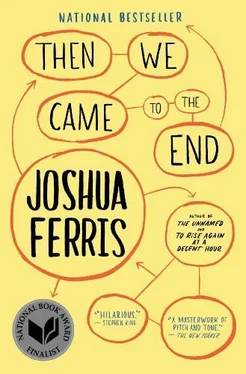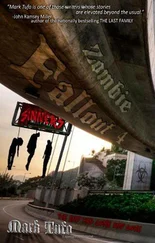There had to be a better story than this one, which was why so many of us spent so much time lost in our own little worlds. Don Blattner was not the only one. Hank Neary, our black writer who wore the same brown corduroy suit coat day after day, so that either he never cleaned the one, or had an entire closet full of the same, was working on a failed novel. He described it as “small and angry.” We all wondered who the hell would buy small and angry? We asked him what it was about. “Work,” he replied. A small, angry book about work. Now there was a guaranteed best seller. There was a fun read on the beach. We suggested alternative topics on subjects that mattered to us. “But those don’t interest me,” he said. “The fact that we spend most of our lives at work, that interests me.” Truly noble, we said to him. Give us a Don Blattner screenplay any day of the week.
Dan Wisdom had gotten encouragement in college from Miles Buford, the painter, who said in his twenty-year teaching career he had never seen a talent like Dan’s. Then Dan graduated and went to work, where he sat behind a Mac manipulating pixels for a sugar-substitute client and wondered if Professor Buford’s flattery was just an attempt to get laid. Dan continued to paint, though, at night and on the weekends, and if his portraits were a little grotesque, we could nevertheless discern a unique vision and a steady line. Maybe it would happen for him. He said no. He said figurative painting was dead. But we liked what he could do with fish.
Deliver us! You could practically hear that plea crying out from the depths of our souls, because none of us wanted to end up like Old Brizz.
Among the very first to be let go, Brizz walked Spanish down the hall like no one before or since. The season of layoffs was interminable, and to give a sense of that, Old Brizz’s termination took place a full year before Tom Mota got the ax. Old Brizz handled it much better than Tom did. He came by all our offices to say farewell. Usually people raced out to escape our gaze. Brizz said he didn’t want to leave without saying good-bye. That was grace under fire, and he carried himself with dignity and pride. He didn’t mind knowing that we knew that they didn’t value him as much as they valued us. Because that’s basically what they said when they walked you Spanish down the hall. He didn’t mind talking to us even after they said that to him in so many words. Or maybe he didn’t even think of it that way. Maybe he wouldn’t have understood our talk of value. “This has nothing to do,” he might have said, “with who’s worth more. Is that what you think? You guys, take it from an old man who’s been in this business a long time. This process has nothing to do with weeding out the worst of us so that the only ones left are the talented and the productive. Come on, don’t fool yourselves. Ha, don’t be foolish. Ha ha, don’t be naive!” We could hear his rattling lungs laughing at us. His coming around to fare us well, so calm, so self-controlled — it was a little unnerving. What did it mean that minutes after walking Spanish down the hall he had the poise to encourage us not to worry about him? He came by each one of our individual offices, he visited the cubicles and the receptionists. We even saw him talking to one of the building guys. They hardly said anything to anyone, the building guys. Just stood on their ladders handing things up and down to one another, speaking in hushed tones. There was never much of an opportunity to get to know them. But Old Brizz was standing at the elevator talking to one building guy in particular for half an hour while holding his box of personal items. One would speak, the other would nod. Then they’d laugh. Who knows what you laugh about with a building guy. But Brizz found it — the funny thing to be shared, even on the day he had been shitcanned. He filed for unemployment right away. A few months later, he still hadn’t found work. He took on a few freelance jobs. Then we didn’t hear from him. Next we knew he was in the hospital. No insurance. He went quick. It was unfortunate, how prescient we were when we said the guy had six months, tops. We visited him — ours seemed his only flowers. We wanted to ask him, Hey, Brizz, man, where’s your family? Instead we snuck him cigarettes, strictly forbidden when one is laid out in the cancer ward. We put one of those smoke-be-gone ashtrays right on his chest, and it caught the exhaust good, so Brizz got in three smokes before the old guy next slot over complained and we were reprimanded by the nurse. When he died, it was hard to believe he was gone. Not just walked Spanish down the hall. Gone gone.
Benny came around to collect. We couldn’t believe it. Benny wasn’t really going to profit from this, was he?
“He was on my list,” he said innocently.
We all shouted, Benny! Come on!
“Come on what?” he cried. “He was at the top of my list! Those are the rules.”
He wasn’t wrong. Those were the rules of Celebrity Death Watch. We all paid him his ten bucks.
At Brizz’s funeral we discovered he had some family after all, a brother with a health-club glow. We called him Bizarro Brizz because he had good skin with a good color. Probably never smoked a cigarette in his life. It was as if jowly, ruddy Brizz had taken off a terrible mask. We offered him our condolences. After preparing ourselves in the pews for a while, some of us braved the front. Brizz in the box looked much healthier than Brizz at his desk. Afterward, at the wake, we tried to recall memories of him. We remembered one thing, the time we stood with him at the parking garage waiting for the bow-tied Hispanics to pull up with our cars. We had our single-dollar tips folded in the palms of our hands. God was it freezing. We were out of the way of the wind under the bright light of the garage, but Chicago in February, if you’ll allow an homage to Brizz, was colder than a witch’s tit in an icebox. He still called a refrigerator an icebox. He sat at his desk once and told us of being a kid and having the ice delivered. “That’s how old I am,” he confided to us in a rare moment. “I remember the ice being delivered.” “Did you used to call Australia ‘Tasmania Land’?” asked Benny. “Not that old,” said Brizz. Just then, Joe Pope arrived at Brizz’s doorway and asked him if he had those headlines ready. That’s what we were talking about with Old Brizz as we waited for our cars in the final freezing February of his tenure as one of us, certain aspects of Joe Pope’s character. We couldn’t pin Old Brizz down, though, try as we might. His car was the first to come out. It was a gray Peugeot, a one-time looker, but rusted around the trim now and dented in places high and low. The real story was the interior. Stuff — crap — accumulated junk — how else to put it? — filled the backseat windows to the roof. Paper mostly, but smashed against the glass we also made out a winter hat, a beer cozy, an unopened package of nude hose — things like that. Along the ledge of the doorframe we noticed scattered coins and green plastic houses from the game of Monopoly. “Brizz,” said Benny. “All these extras come from the dealership?” “Have you guys never seen my car before?” Brizz asked with pride. “Is that what this is?” asked Larry Novotny. “A car?” He bent at his knees and resettled his Cubs cap on his thinning hair while peering through the windows at the trash heap inside. The front passenger seat was hardly any better than the back, but there was a nice niche carved out for the driver behind the wheel. We had to wonder — who keeps a car like that? Was he really one of those people? The car-park man got out and turned the car over to Brizz, but Brizz never tipped. That was another thing about Brizz: he usually stayed in and ate his baloney sandwiches, but when he came out to lunch with us, we had to supplement his share of the tip so as not to screw the waitress, which made us hate him momentarily. “I got a tip for you,” he replied, when someone asked him once why he was so cheap. “Never take no wooden nickels.”
Читать дальше












